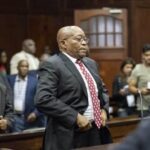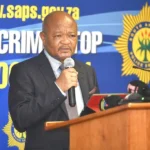A cloud of controversy hangs over Agriculture Minister John Steenhuisen as key members of his staff have gone unpaid for three months, sparking accusations of "incompetence and malice" within government departments.
Multiple sources inside the department have confirmed the growing discontent among Steenhuisen’s team. They allege that bureaucratic hurdles within both the Department of Agriculture and the Department of Public Service and Administration are deliberately delaying the finalisation of staff appointments, leaving crucial personnel without salaries.
Adding fuel to the fire is the saga surrounding Roman Cabanac, a controversial social media activist appointed by Steenhuisen as his head of staff. Following intense pressure, Steenhuisen requested Cabanac’s resignation two weeks ago. However, Cabanac appears to be refusing to comply, creating further tension within the ministry.
The situation has been further complicated by a leaked letter. Steenhuisen wrote to Public Service and Administration Minister, Mzamo Buthelezi, requesting a deviation from the minimum appointment requirements for certain positions in his office. Sources claim this letter never reached Buthelezi but was instead leaked to the media in a deliberate attempt to embarrass the minister.
Buthelezi’s office confirmed a month ago that the letter had not yet arrived, citing protocols and processes as the reason for the delay. However, a source close to the situation expressed surprise that the contents of the letter were made public before reaching the intended recipient.
The leaked letter, as reported by News24, revealed Steenhuisen’s nominations for key positions: Annette Steyn, former DA MP and spokesperson for agriculture, as special advisor; Una Christians as his private secretary; Charity McCord as his presidential spokesperson; and a Mr Kruger as his parliamentary spokesperson.
McCord currently serves as Steenhuisen’s spokesperson in his capacity as DA leader. Three of these four nominees reportedly hold matric certificates but lack the minimum tertiary academic qualifications typically required for such roles. One candidate reportedly possesses the necessary qualifications but lacks the required managerial experience.
Defenders of Steenhuisen argue that the candidates' extensive work experience and proven track records make them well-suited for their respective roles. A source within the department argued.
"It’s clear that there are people within the department who’re opposed to Steenhuisen’s appointment as minister. Information’s being leaked to embarrass him, and his choice of candidates and their academic qualifications are being completely blown out of proportion, taken out of context and used as a political football. The fact of the matter is that ministers’ office staff are linked to the minister’s term, because [their appointments are] based on his personal choices and a relationship of trust. Work experience and trust therefore count much more than qualifications," said the source.
The controversy surrounding Cabanac’s appointment has seemingly triggered a new wave of scrutiny, with all of Steenhuisen’s staff, regardless of their position, now subjected to top security clearance procedures.
This move has been met with anger and suspicion. A source within the department stated: “It feels as if John’s office staff are being intimidated to prove their loyalty to the state.”
The source further suggested that officials view Steenhuisen’s staff as a threat, using the Cabanac appointment as justification for their lack of cooperation.
Steyn, in particular, is reportedly facing resistance from senior officials within the department. Sources suggest this stems from her previous role as a DA MP, where she openly criticised their alleged corrupt activities. “They blame her and are doing everything in their power to resist and work her out,” claimed the informant.
McCord, in her capacity as Steenhuisen’s spokesperson, directed enquiries to the Department of Agriculture. Linda Page, head of communications for the department, confirmed that only Cabanac’s appointment had been finalised within Steenhuisen’s office, with a community outreach officer position set to be filled on 1 October.
She further confirmed that positions for a special advisor, spokesperson, assistant, private secretary, two receptionists, and two domestic assistants remain vacant. Page denied that the Cabanac controversy has impacted the appointment process, stating that the department is focused on filling the vacancies and improving capacity within the minister's office.
Cabanac, meanwhile, maintains that he is still performing his duties and cannot submit his resignation until the department clarifies the process for relinquishing his position. Page countered this, stating that the Public Service Act requires a signed resignation letter before any human resources management process can begin.
The State Security Agency declined to comment on the security clearance procedures, citing operational matters. The Department of Public Service and Administration has not yet responded to requests for comment.
Steenhuisen’s appointment as Agriculture Minister has been met with both anticipation and scepticism. The 48-year-old politician aims to reshape the political landscape and steer South Africa towards a shared vision of progress and prosperity. However, his educational background has become a point of contention.
Steenhuisen has addressed the criticism surrounding his qualifications. During a 2018 National Assembly debate, he revealed that financial constraints forced him to abandon his studies at the University of South Africa (Unisa). He acknowledged his unfinished degree but stressed that he had never misrepresented his academic credentials, stating, "I am not ashamed of this because I knew from an early age that I wanted to be a public representative."
Despite his truncated university career, Steenhuisen’s academic performance during his time at Unisa was noteworthy. In a late 2018 tweet, he proudly shared certificates of merit for excelling in various political modules, demonstrating his intellectual capabilities and commitment to learning.
The question of formal education and its relevance to political leadership has been a recurring theme in South African politics. The trajectory of former President Jacob Zuma, who also lacked formal education, serves as a prominent example. Zuma’s rise to power, despite not obtaining a matric certificate and being a Grade 1 dropout, underscores the importance of charisma, political acumen, and the ability to connect with the electorate. Like Zuma, Steenhuisen's journey demonstrates that formal education does not solely define a person's intelligence, capability, or potential.

Follow Us on Twitter










